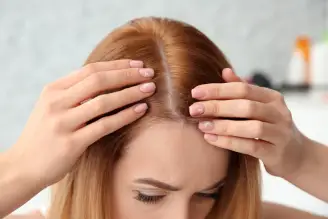
In the diverse landscape of cosmetic concerns, hair loss stands out as a common issue that affects men and women across various age groups. Often, the root cause of hair thinning and bald patches is not just physical but emotional, leading many to wonder, Does stress cause hair loss? The simple answer is yes, stress can significantly impact hair health, leading to noticeable hair loss.
Understanding Hair Loss
The medical term for hair loss, alopecia, encompasses a broad range of hair loss types affecting people at different stages of their lives. While shedding 50 to 100 hairs a day is considered normal, excessive loss or thinning in specific areas can signal an underlying issue. Reasons for hair loss are varied, including temporary illnesses, hormonal changes during pregnancy, medical treatments like chemotherapy, and, notably, emotional stress.
The Link Between Stress and Hair Loss
The phenomenon linking stress to hair loss, a condition scientifically recognised as telogen effluvium, illustrates a fascinating aspect of the body’s response to emotional distress. When an individual undergoes a period of intense stress, the body’s natural reaction can significantly disrupt the normal hair growth cycle. This disruption is most notably observed when an unusually large number of hairs prematurely enter the resting phase of their growth cycle, halting the production of new hair strands and leading to noticeable hair thinning or loss approximately three months following the stressful incident.
This delay between the stressful event and the onset of hair loss often leaves individuals perplexed, as the connection may not be immediately evident. However, understanding this link is crucial for addressing the issue effectively. While the impact of stress on hair follicles is profound, it’s important to note that it does not inflict permanent damage on them. Instead, this type of hair loss is largely temporary and reversible. As stress levels begin to normalise, so too does the hair growth cycle. Eventually, the hair follicles resume their active growth phase, leading to the restoration of hair density over time. This recovery process underscores the the body’s remarkable ability to heal and rebalance itself once the stressor has been mitigated or removed.
Types of Stress-Related Hair Loss
Stress-related hair loss manifests in various forms, each with distinct characteristics and implications for the individual affected. Understanding these types can provide insight into the mechanisms of stress-induced hair conditions and guide them towards appropriate management strategies.
Telogen Effluvium is the most common form of stress-induced hair loss, characterised by a general thinning of hair across the entire scalp. This condition emerges when an excessive number of hair follicles prematurely enter the telogen, or resting, phase of the hair growth cycle, halting the production of new hair strands. The trigger, often a significant stressful event or period, disrupts the normal balance of hair growth and rest, leading to noticeable hair thinning several months after the initial stressor. Fortunately, telogen effluvium is typically reversible, with hair gradually regaining its normal fullness as stress levels decrease and the follicles return to their growth phase.
Alopecia Areata represents a more severe, though less common, stress-related hair loss condition. It is marked by the sudden appearance of one or more round bald patches on the scalp, and sometimes on other areas of the body where hair is present. The condition is believed to be an autoimmune response, where stress acts as a trigger for the body to attack its own hair follicles, leading to hair loss. Treatment options include corticosteroid injections and topical immunotherapy to encourage hair regrowth, though the response varies among individuals.
Trichotillomania, often referred to as hair-pulling disorder, is a psychological condition driven by the compulsive urge to pull out one’s hair, whether from the scalp, eyebrows, or other areas, often leading to noticeable bald spots. This behaviour is typically a coping mechanism for stress or anxiety, and individuals may pull their hair in response to feelings of tension or as a means of relief. Managing trichotillomania often requires a multidisciplinary approach, including behavioural therapy and counselling to address the underlying emotional triggers.
Each of these conditions highlights the complex interplay between psychological stress and physical health, specifically regarding hair growth and loss. Understanding the nuances of these stress-related hair loss types is crucial for identifying the most effective treatment and management strategies to mitigate their impact.
Identifying Stress-Related Hair Loss
Identifying stress-related hair loss involves a few key steps:
- Observe Stress Levels: Note any periods of high stress or anxiety you’ve experienced, especially if they align with the onset of hair loss.
- Timing is Key: Look for a pattern where hair thinning or loss occurs roughly three months after a stressful event or period.
- Assess Hair Loss Pattern: Unlike genetic hair loss, stress-related hair loss often presents as a general thinning across the scalp rather than receding hairlines or bald patches.
- Identify Stress Sources: Pinpoint potential sources of stress in your life that could be contributing to hair loss.
- Seek Solutions: Once stress is identified as a likely cause, explore stress management and reduction techniques to help mitigate hair loss and encourage regrowth.
Managing and Treating Stress-Related Hair Loss
Addressing stress-related hair loss involves tackling the root cause: stress. Here are some strategies:
– Ensure you’re getting enough sleep and maintain a routine that promotes rest.
– Stay hydrated and eat a balanced diet to support hair growth.
– Incorporate regular physical activity into your daily routine.
– Engage in relaxation practices like yoga, meditation, or mindfulness exercises.
– Don’t hesitate to seek support or talk about your concerns with friends, family, or professionals.
These lifestyle adjustments can significantly lower stress levels, fostering an environment where hair can regrow.
Does Stress Cause Hair Loss? Yes, But It’s Reversible
The correlation between stress and hair loss is undeniable, yet the knowledge that such hair loss is reversible brings a considerable measure of relief and optimism. Does stress cause hair loss? Yes, and stress, by disrupting the natural hair growth cycle, can lead to conditions like telogen effluvium, where hair enters the resting phase prematurely, resulting in widespread thinning. However, this type of hair loss does not signify permanent damage to the hair follicles. Instead, it highlights the body’s temporary response to emotional or physical stressors. Recognising the role of stress in hair loss is the first step toward recovery. By adopting effective stress management techniques and nurturing overall well-being, individuals can stimulate their hair to resume its natural growth cycle. This process underscores the body’s remarkable ability to recover, ensuring that with time and care, hair can regrow to its former density, restoring both appearance and confidence.
Is Hair Transplant Painful?
For those considering more permanent solutions for hair loss not solely related to stress, such as hair transplants, concerns about pain are common. Is hair transplant painful? Modern hair transplant techniques, performed under local anesthesia, have evolved to minimise discomfort during and after the procedure. While individual experiences vary, most patients report feeling minimal pain during the surgery, often describing it as mild discomfort. Post-operative care is crucial, and any discomfort can typically be managed with over-the-counter pain medication.
Conclusion
Hair loss, particularly when induced by stress, is a condition that affects many but is also largely reversible. At Zestige Private Healthcare, we understand the complexities surrounding hair loss and the various factors that contribute to it, including stress. Whether you’re considering a hair transplant or seeking ways to manage stress-related hair loss, our team is here to support and guide you towards achieving not just hair regrowth, but improved overall well-being. With the right support and care, regaining a full head of hair and reducing stress are both achievable goals. Reach out to Zestige Private Healthcare today to explore how we can help you on your journey to recovery and renewal.



